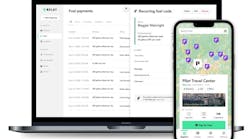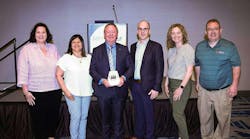COMPANY:
CENTRAL FREIGHT LINES
OPERATION:
Less-than-truckload, for-hire carrier with 750 drivers engaged in pickup and delivery operations in 16 states.
PROBLEM:
“Every time your company causes the need for a damages claim, it damages your reputation as a carrier,” says Mark Stein, director of operations services for Central Freight Lines. Three years ago, the Texas-based LTL carrier was looking at a claims rate of about 93%, in spite of the fact that it had already made investments in fleet management technologies.
“We knew that the results you get out of any system are only as good as the data you put in,” Stein says. “We have a very good activity-based costing system from Transportation Costing Group that can prorate a portion of a trip right down to the minute. The problem was that if the system does not have actual information, it uses industry averages. If you use averages, then everybody looks the same.
“We had to improve the integrity of the information,” he says. “We needed to capture much more accurate data about pickup and delivery times, time between stops, and arrival and departure times. Some customers were also telling us that they needed access to more real-time status information about their loads, or they'd have to look elsewhere.”
SOLUTION:
Central Freight Lines chose to implement a dispatch solution from Cheetah Software Systems Inc. “We believed that Cheetah would not only allow us to do a better job dispatching, but also enable us to pass much more accurate data to our costing system,” says Stein. Now in its third year of use, the Cheetah system is delivering as hoped, he notes. The company boasts a 99.58% claims-free operation and has seen a 5 to 10% decrease in miles per customer stop as well as increases in productivity.
Today, Central Freight Lines' drivers use GPS-enabled phones to input time-stamped information about arrivals, loading and unloading, and departures. “Within minutes of a transaction, we can know what actually occurred,” Stein says. “[The level of detail] is like looking through a magnifying glass at our operation.”
According to Stein, access to better data had enabled the costing system to really live up to its potential in terms of delivering useful, actionable information. “Many carriers will deeply discount their very largest accounts, even to the point of being unprofitable or nearly so,” he explains. “Now we can see exactly what it costs us to service a particular customer so we can price our work appropriately. One account does not end up subsidizing another.”
“With Cheetah, we were also able to do some consolidating of dispatch operations to area dispatch hubs,” Stein notes, reducing overhead. Customers are also appreciating the real-time, on-demand access to load status information.
“We also have a very firm company policy about cell phone usage — you must be stopped before you can use the phone,” he adds. “The great thing about this system is that the phones aren't needed except at stops. They have actually enhanced our drivers' ability to focus on their driving because they aren't responding to calls from dispatchers or worrying about clipboards of loose papers.”
Stein says the company plans to upgrade the cell phones in the next few months to go to a touchscreen interface that will take them to the next level. “Once you provide decision-makers with the powerful information technology can provide, as long as the system is deployed properly and works well, they can't imagine going back,” he says.


